Esophageal cancer primarily consists of two main types: squamous cell carcinoma and adenocarcinoma, each with distinct characteristics and risk factors.
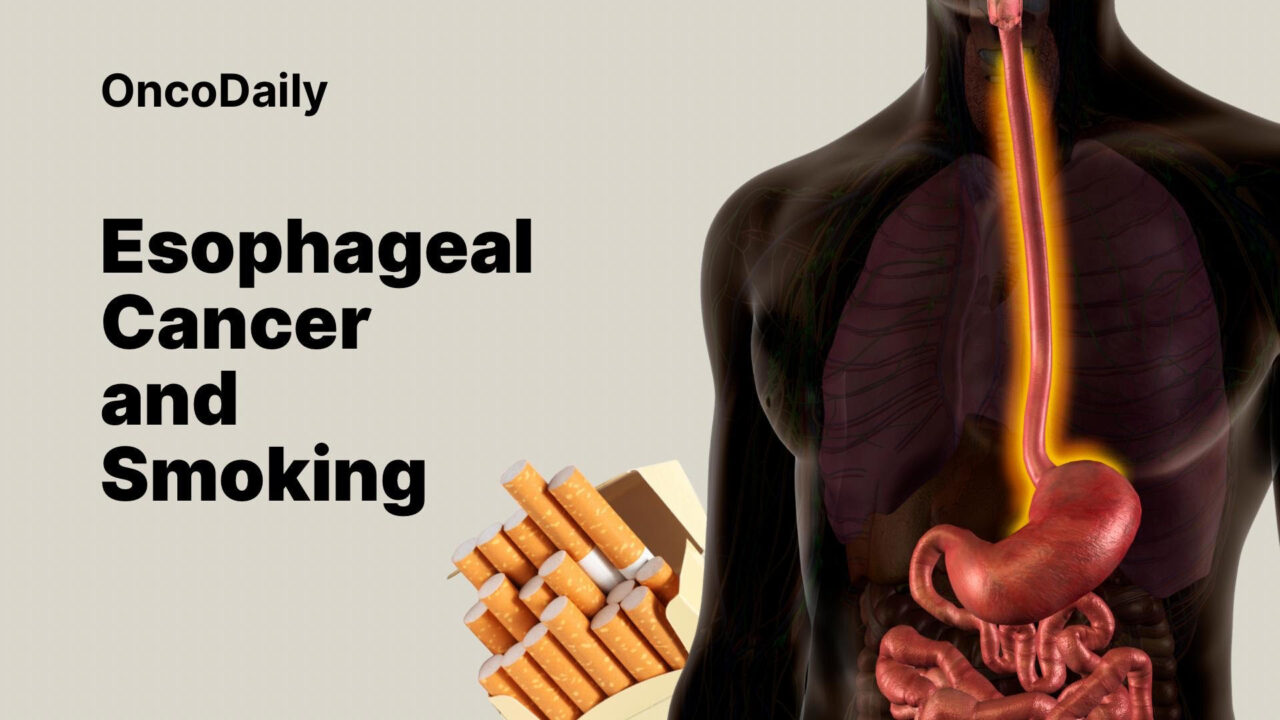
Jul 25, 2025, 15:07
Esophageal Cancer and Smoking: What You Need to Know To Protect Yourself?
Esophageal cancer is a serious and aggressive cancer affecting the muscular tube connecting the throat to the stomach. Globally, it ranks as the seventh most common cancer and the sixth leading cause of cancer deaths, with around 604,000 new cases and 544,000 deaths reported in 2020. The disease is especially prevalent in Asia, which accounts for about 80% of cases, with China alone responsible for half of the global burden. Men are disproportionately affected, making up nearly 70% of cases.
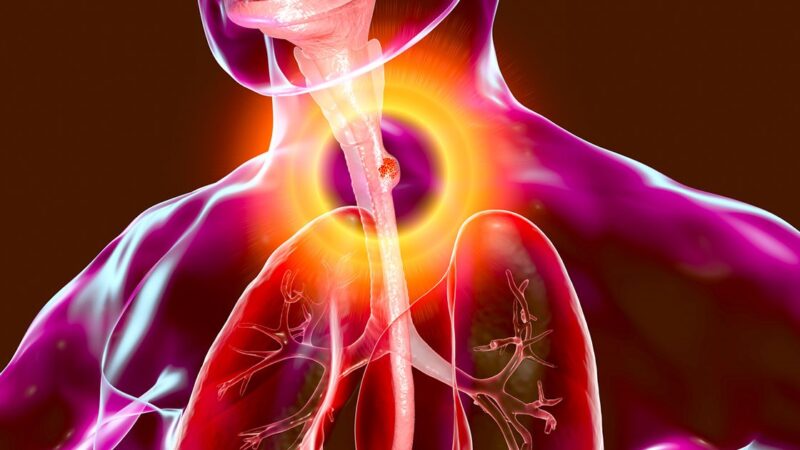
Smoking is a major risk factor for esophageal cancer, responsible for 40 to 50% of deaths in men worldwide. Smokers have a two- to five-fold higher risk of developing the disease, particularly the squamous cell type. Other factors like alcohol use, obesity, and acid reflux also contribute but smoking remains the most significant preventable cause. Despite slight declines in rates, the total number of cases continues to rise due to population growth and aging, especially in low- and middle-income countries. Reducing tobacco use is therefore crucial in lowering the global impact of esophageal cancer.In this article we will learn about esophageal cancer,types,risk factors. Global Cancer Observatory, 2020.
What Are the Different Types of Esophageal Cancer?
Squamous cell carcinoma arises from the flat, thin cells lining the upper and middle parts of the esophagus. This type is strongly linked to smoking and alcohol consumption. It is more common in regions such as Asia and parts of Africa, where tobacco use and heavy drinking are prevalent. The carcinogens in tobacco smoke directly damage the esophageal lining, increasing the risk of developing this cancer subtype.American Cancer Society,2024.
Adenocarcinoma, on the other hand, develops from glandular cells typically found in the lower esophagus near the stomach. This type is often associated with chronic acid reflux (gastroesophageal reflux disease or GERD) and obesity, which can cause changes in the esophageal lining known as Barrett’s esophagus—a precursor to adenocarcinoma. While smoking also raises the risk of adenocarcinoma, its connection is less pronounced compared to squamous cell carcinoma. Memorial Sloan Kettering Cancer Center, 2023
How Smoking Increases Esophageal Cancer Risk?
Smoking increases esophageal cancer risk by exposing the esophagus to carcinogenic chemicals found in tobacco smoke, which directly damage the DNA in cells lining the esophagus and impair their ability to repair themselves. Moreover, smoking can weaken the esophageal sphincters, increasing acid reflux and chronic inflammation—both of which contribute further to the development of cancer.
DNA Damage in the Esophageal Cells
Smoking contributes to esophageal cancer by causing DNA damage in the cells lining the esophagus. Tobacco smoke contains numerous carcinogens that induce mutati ons by directly damaging the DNA, leading to errors during cell replication. Normally, cells rely on complex DNA damage repair (DDR) pathways to detect and fix such damage, maintaining genomic stability. Two key repair mechanisms for double-strand breaks—the most lethal form of DNA damage—are homologous recombination (HR) and non-homologous end joining (NHEJ). HR is a precise repair process using a healthy DNA strand as a template, while NHEJ is more error-prone, simply joining broken DNA ends, sometimes causing mutations. Xinyi Wang, Journal of Gastrointestinal Oncology, 2023.
Carcinogens and Lifestyle Factors Increasing Esophageal Cancer Risk
Beyond tobacco smoke, exposure to polycyclic aromatic hydrocarbons (PAHs) and volatile organic compounds (VOCs)—byproducts of incomplete combustion found in smoke, air pollution, and fumes from cooking and heating—also contributes to esophageal cancer risk. These chemicals are classified by the International Agency for Research on Cancer (IARC) as probable or possible carcinogens based on laboratory and animal studies, and recent human biomarker studies confirm their association with esophageal cancer.
The combined effect of smoking and alcohol consumption further amplifies the risk. Alcohol metabolizes into acetaldehyde, a toxic and carcinogenic substance that, together with tobacco carcinogens, significantly increases the likelihood of developing esophageal squamous cell carcinoma. Zuo-Feng Zhang, International Journal of Cancer, 2025.
Chronic Inflammation During Esophageal Cancer
Chronic inflammation significantly contributes to esophageal cancer by causing ongoing damage to the esophageal lining. Conditions like acid reflux (GERD) lead to repeated irritation, producing harmful molecules that damage DNA and increase mutation rates. This persistent inflammation activates key pathways such as NF-κB and JAK/STAT3, which promote cell growth and survival, aiding cancer development. Inflammatory proteins like COX-2 and IL-6 further support tumor growth. Managing chronic inflammation is therefore crucial in preventing esophageal cancer and improving treatment outcomes. Frontiers in Oncology, 2022.
Suppressed Immune Response and Creation of Esophageal Cancer
Smoking weakens the immune system’s ability to fight esophageal cancer by creating an immunosuppressive tumor microenvironment that helps cancer cells evade immune attack. One key mechanism is the downregulation of major histocompatibility complex (MHC) molecules on tumor cells, which are essential for presenting cancer antigens to immune cells. Studies show that in esophageal squamous cell carcinoma, about 41% of patients have no detectable MHC class I expression, severely impairing immune recognition.
Additionally, smoking and tumor-related factors increase the production of immunosuppressive cytokines such as transforming growth factor-beta (TGF-β) and interleukins (IL-4, IL-6, IL-10). These molecules promote the activation of regulatory T cells (Tregs) and tumor-associated macrophages that suppress cytotoxic immune cells, further dampening anti-tumor immunity. Smoking also induces expression of immune checkpoint proteins like PD-L1 on tumor cells, which inhibit the activity of cytotoxic T lymphocytes by engaging PD-1 receptors, leading to immune exhaustion. Journal of Thoracic Oncology, 2021.
How Does Smoking and Alcohol Use Increase the Risk of Esophageal Cancer?
Epidemiological evidence clearly shows that smoking significantly increases the risk of esophageal cancer. Smokers are at least twice as likely to develop esophageal cancer compared to non-smokers. This elevated risk is particularly notable for squamous cell carcinoma, where heavy smokers may experience a 5- to 10-fold increase in risk. The danger is even greater when smoking is combined with alcohol consumption.
Studies have found that people who both smoke and drink heavily can have a 10 to 15 times higher risk of developing esophageal squamous cell carcinoma compared to those who neither smoke nor drink. In the United States, up to 90% of esophageal squamous cell carcinoma cases are linked to a combination of smoking, alcohol use, and poor diet.
Smoking alone is a major contributor, but its impact is amplified when combined with other risk factors. These findings highlight that most cases of this cancer subtype could potentially be prevented by eliminating tobacco and excessive alcohol use. The mechanism behind this increased risk involves carcinogens in tobacco smoke that damage the DNA of esophageal cells, promoting abnormal growth and cancer formation. Smoking can also contribute to other conditions, such as gastroesophageal reflux disease, which further increases the risk for certain types of esophageal cancer. Overall, the evidence underscores the importance of smoking cessation and reducing alcohol intake in preventing esophageal cancer, especially the squamous cell subtype. Roswell Park Comprehensive Cancer Center, 2022.
How Does Smoking Affect Prognosis and Survival in Esophageal Cancer?
Smoking negatively impacts prognosis in esophageal cancer, especially esophageal squamous cell carcinoma (ESCC). A meta-analysis and pooled review of eight studies involving over 4,000 patients found that current smokers with ESCC had significantly poorer survival compared to never smokers, with hazard ratios around 1.4 to 1.5. Heavy smoking was associated with even worse survival outcomes, particularly in patients treated with chemoradiotherapy. The mechanisms proposed include smoking-induced tumor hypoxia, altered metabolic enzyme activity reducing chemotherapy efficacy, and increased tumor aggressiveness. Additionally, smoking contributes to comorbidities such as cardiovascular and respiratory diseases, which further worsen overall survival. These findings underscore the importance of smoking cessation to improve outcomes after esophageal cancer diagnosis.
A 2023 study focusing on ESCC patients in China also demonstrated that smokers had significantly worse overall survival and disease-free survival compared to non-smokers. The study found that a higher smoking index (reflecting intensity and duration) independently predicted poorer prognosis, reinforcing the dose-response relationship between smoking and survival. Another meta-analysis published in 2017 showed that smoking cessation reduces esophageal squamous cell carcinoma risk over time, which indirectly supports improved prognosis with reduced smoking exposure. Shuwei Chen, Tobacco Induced Diseases, 2023.
Benefits of Smoking Cessation
Studies consistently show that quitting smoking leads to a significant reduction in esophageal cancer risk over time. Within five years of cessation, the risk decreases by approximately 50%, and this decline continues with longer periods of abstinence. This risk reduction is particularly notable for esophageal squamous cell carcinoma, the subtype most strongly linked to tobacco use.
A 2021 meta-analysis published in Cancer Epidemiology, Biomarkers & Prevention reviewed multiple cohort studies and confirmed that former smokers have substantially lower esophageal cancer incidence compared to current smokers, with risk approaching that of never smokers after 10 to 15 years of cessation. The protective effect of quitting is attributed to the gradual repair of DNA damage and reduction of chronic inflammation caused by tobacco carcinogens.
In terms of prognosis, recent clinical studies indicate that former smokers diagnosed with esophageal cancer, especially squamous cell carcinoma, have better survival outcomes than current smokers.
A 2023 study in Frontiers in Oncology found that smoking cessation prior to diagnosis was associated with improved overall and disease-free survival, likely due to better treatment response and fewer smoking-related comorbidities. These findings emphasize the importance of smoking cessation not only for prevention but also for improving outcomes after diagnosis. Shao-Hua Xie,JNCI 2021.
Overall, the evidence supports that quitting smoking significantly lowers esophageal cancer risk and enhances survival prospects, reinforcing smoking cessation as a critical intervention in esophageal cancer control.
You Can Also Read In Memory of Robert Kardashian: His Courageous Battle with Esophageal Cancer by Oncodaily
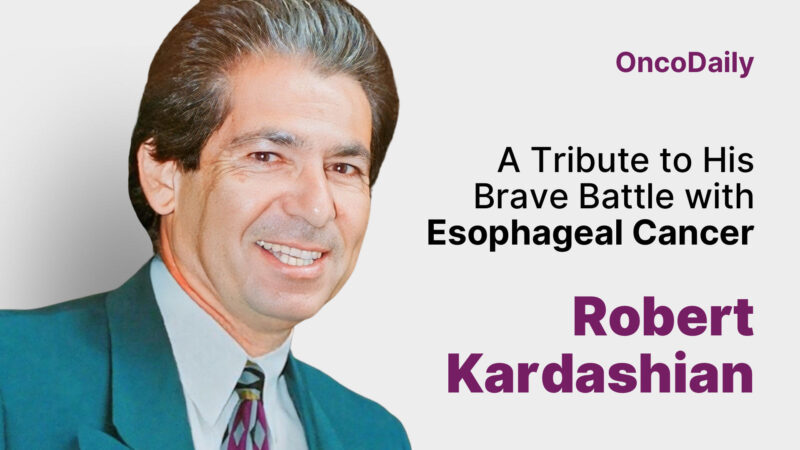
Prevention and Public Health
The most effective way to lower the risk of esophageal cancer is to avoid smoking entirely or to quit if you currently smoke. Tobacco use, including cigarettes, cigars, pipes, and smokeless tobacco, is a major risk factor, and quitting smoking significantly reduces this risk. Limiting alcohol intake also plays a crucial role in prevention, as alcohol consumption increases esophageal cancer risk, especially when combined with smoking. Health authorities recommend keeping alcohol consumption to no more than two standard drinks per week to minimize risk.
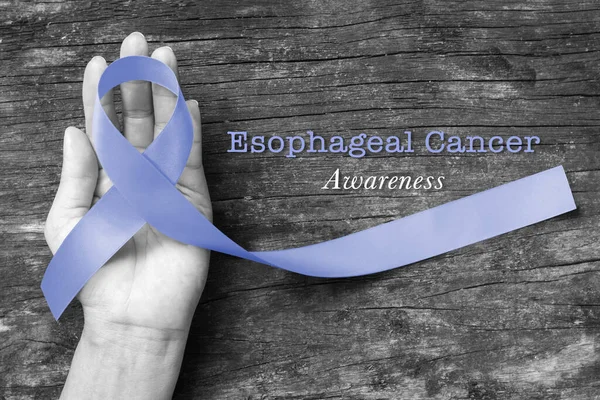
Photo: Depositphotos
A healthy diet rich in fruits and vegetables further contributes to lowering esophageal cancer risk. Consuming a variety of vegetables, especially green, yellow, and cruciferous types like broccoli and cabbage, provides protective nutrients. Maintaining a healthy body weight is also important because obesity increases the risk of esophageal adenocarcinoma, partly by promoting acid reflux and Barrett’s esophagus, which are precancerous conditions. Physical activity and avoiding processed meats and very hot beverages can additionally help reduce risk.
These prevention strategies are supported by leading cancer organizations such as the Canadian Cancer Society and Penn Medicine, which emphasize tobacco cessation, alcohol moderation, healthy eating, and weight management as key lifestyle changes to reduce esophageal cancer risk. Early detection and treatment of conditions like gastroesophageal reflux disease (GERD) also contribute to prevention efforts.
In summary, avoiding tobacco, limiting alcohol, eating more fruits and vegetables, and maintaining a healthy weight form the cornerstone of esophageal cancer prevention and public health recommendations. Canadian Cancer Society, 2025.
You Can Also Read Gastric Cancer and Smoking — What Are the Shocking Real Risks? by Oncodaily
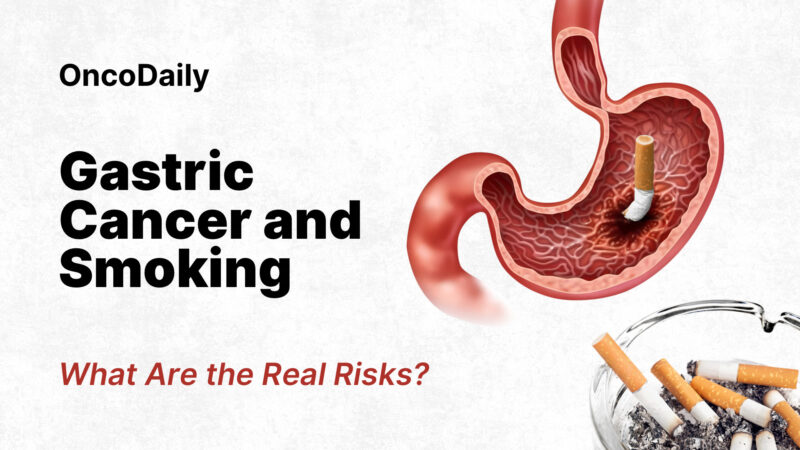
Written by Meri Kirakosyan
FAQ
How much does smoking increase the risk of esophageal cancer?
Smoking increases the risk of esophageal cancer by about 1.4 to 5 times, depending on the population and smoking intensity. Heavy smokers can have up to a 5- to 10-fold increased risk, especially for esophageal squamous cell carcinoma (ESCC).
Does quitting smoking reduce the risk of esophageal cancer?
Yes. Former smokers have a significantly lower risk compared to current smokers but may still have an elevated risk compared to never smokers even 10 years after quitting.
How does smoking combined with alcohol consumption affect esophageal cancer risk?
The combined effect greatly amplifies risk, with people who both smoke and drink heavily having a 10-to-15 times higher chance of developing esophageal squamous cell carcinoma compared to neither smokers nor drinkers.
Are certain types of esophageal cancer more linked to smoking?
Smoking is more strongly associated with esophageal squamous cell carcinoma than adenocarcinoma, though it contributes to the risk of both types.
Does passive (secondhand) smoking contribute to esophageal cancer risk?
Some studies, especially in China, have shown that passive smoking may nearly double the risk for esophageal squamous cell carcinoma, indicating it is also a risk factor.
Does smoking affect esophageal cancer risk differently by gender or age?
The risk increase due to smoking is generally higher among men and people over 55 years old, with some populations showing less pronounced risk in women.
What mechanisms explain how smoking causes esophageal cancer?
Tobacco smoke contains over 60 carcinogens that damage DNA in esophageal cells, causing mutations and promoting cancer. Smoking may also contribute to acid reflux and chronic inflammation that further increase risk.
-
Challenging the Status Quo in Colorectal Cancer 2024
December 6-8, 2024
-
ESMO 2024 Congress
September 13-17, 2024
-
ASCO Annual Meeting
May 30 - June 4, 2024
-
Yvonne Award 2024
May 31, 2024
-
OncoThon 2024, Online
Feb. 15, 2024
-
Global Summit on War & Cancer 2023, Online
Dec. 14-16, 2023
Sep 7, 2025, 15:52
Sep 7, 2025, 15:47
Sep 7, 2025, 15:37
Sep 7, 2025, 15:24
Sep 7, 2025, 14:57
Sep 7, 2025, 14:41
